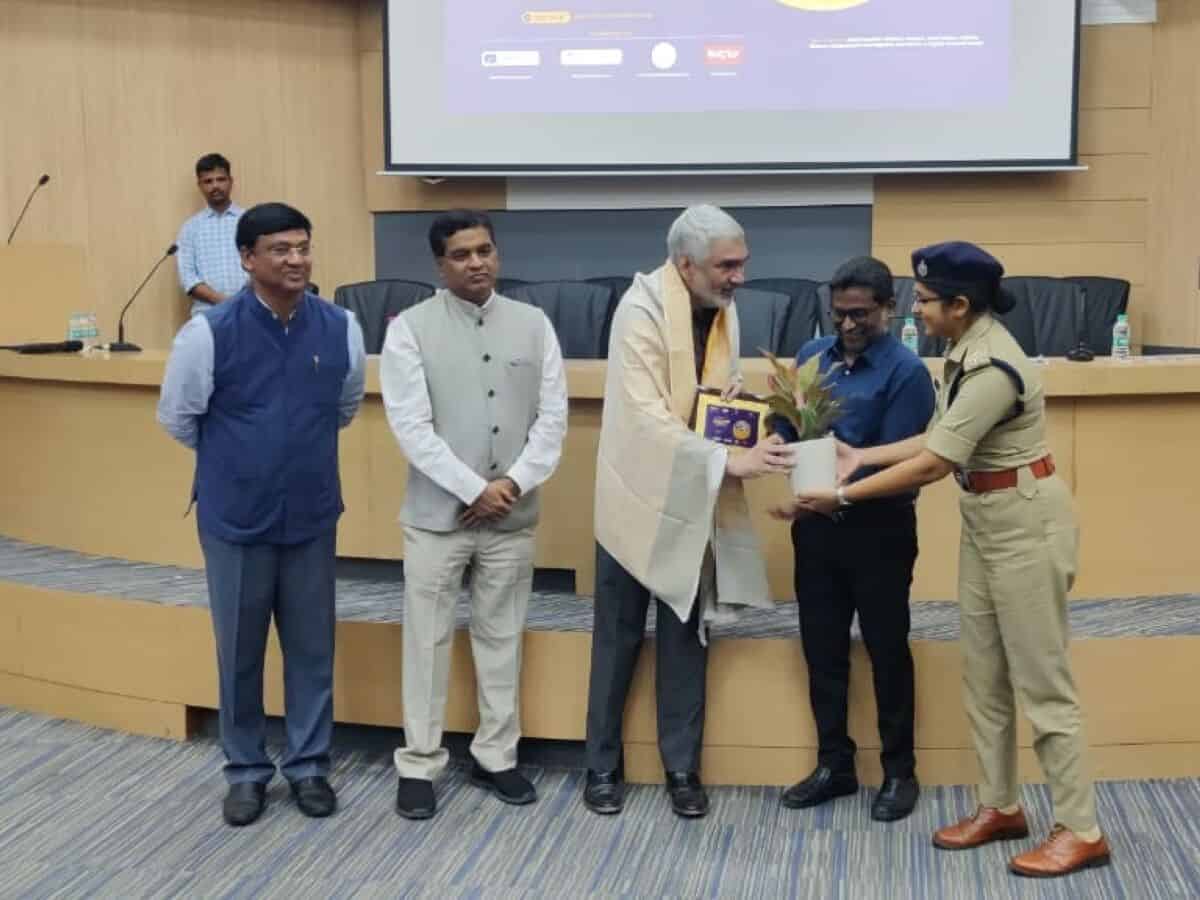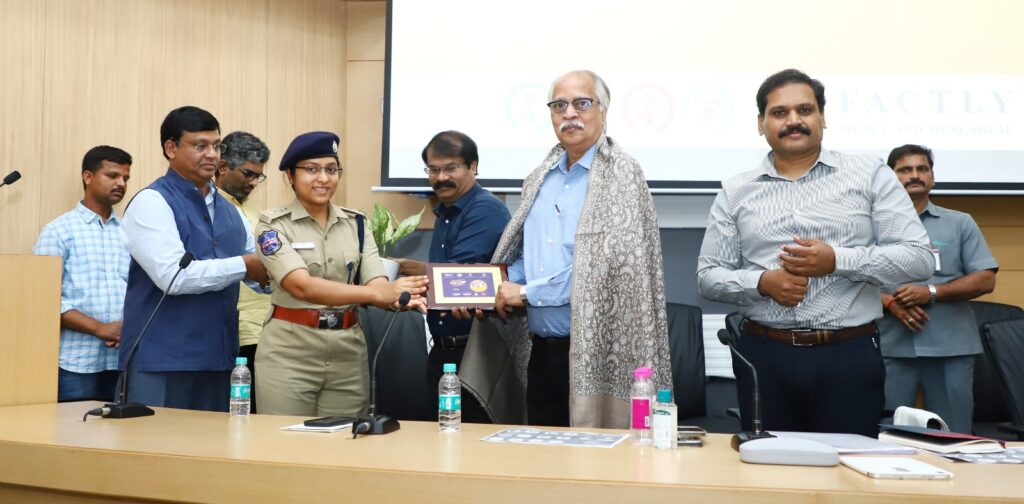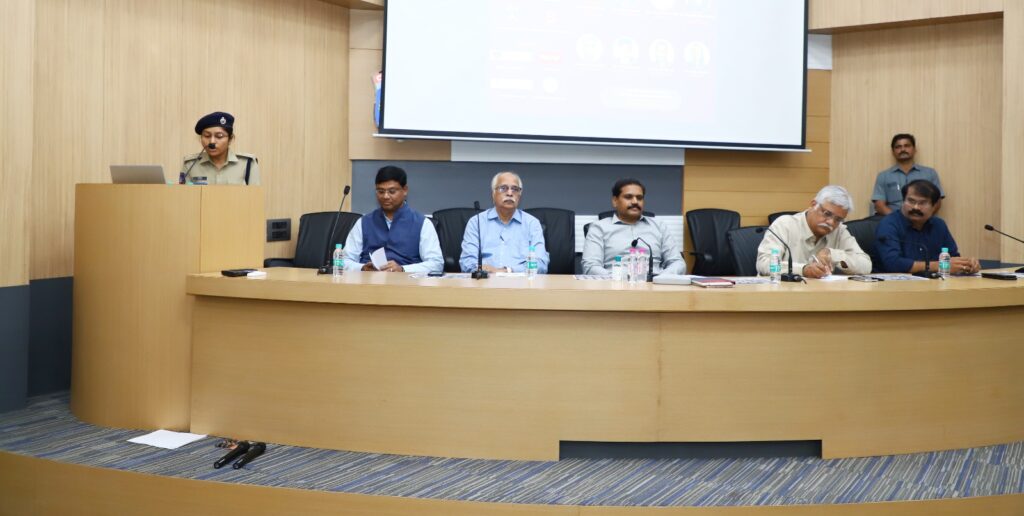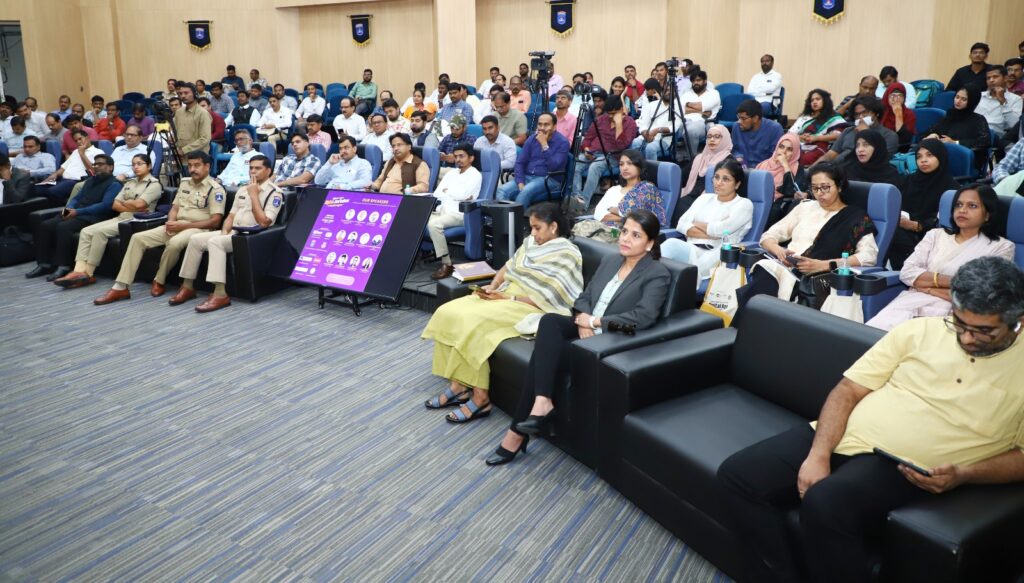
A workshop was conducted on May 13 for Digital media journalists on Challenges in the New age of Digital Journalism, at Cyberabad Police Commissionerate by Cyberabad police, along with End Now Foundation, Telangana State Police Centre of Excellence for Cyber Safety (TSPCC) and Society for Cyberabad Security Council (SCSC).
The workshop was conducted under the adept guidance of the Commissioner of Police of Cyberabad, Stephen Raveendra. The workshop was graced by the presence of Sreenivas Reddy, Editor Telangana Today, Soma Shekhar, The Hindu and eminent speakers like Rakesh Dubbudu, founder of Factly, Anil Rachamalla, founder of End Now Foundation, Sai Teja Kaveti, a practicing Supreme Court Lawyer, Sushil Rao, Special Editor Times of India and Dr. Sonia Sharma, a practicing psychiatrist.
The objective of the workshop was to enable the digital media journalists to improve credibility of news they put up, equip them with tools to do fact checking to ensure validity of information before they publish it and understanding how to identify and differentiate between misinformation, malinformation and disinformation. They were enlightened on cyber domain laws that is applicable to them, cautioned of the consequences of reporting half-baked news and sensitized of the mental well-being challenges that comes with their profession.

The workshop began with opening remarks by Ritiraj DCP Cybercrimes, Cyberabad who set the tone for the workshop. Anil Rachamalla then introduced the topic and explained the gravity of the problem we faced because of lack of guidance to digital media journalists. Sreenivas Reddy then spoke about Citizen Journalism and explained of its boons and banes and the responsibilities that come with it. He explained how information dissemination was linear earlier, whereas presence of multiple sources now confuses people. He said that a search engine driven world has created a cognitive surplus in our society which can be tapped for good purposes, however it can be abused as well which we have to be aware of.
Soma Shekhar who used to work with The Hindu earlier, emphasized on the difference between perception creation and news, which journalists have to be careful of. He said there are people who earn money for peddling untruth, but whether it is done with malicious intent or not, it can lead to serious consequences like communal riots, law and order situations, murders, destruction of property etc.
Commissioner of Police, Cyberabad Stephen Raveendra then focused on differentiating between misinformation, malinformation and disinformation. He said, in today’s age of information disorder, as representatives of law enforcement and digital media, we share an enormous responsibility to address this problem head-on, and it is our duty to ensure that the integrity of the truth prevails. He explained the seven forms of common information disorder that prevail and how they can have disastrous impact on our society, politics, economies, and indeed, the very fabric of our democracy.
Krishna Yedula, secretary General of Society for Cyberabad Security Council (SCSC), one of the organising partners and active contributors then explained how presence of unverified information in the digital domain also leads to cyber crime issues and called on to the journalists to do their part in verifying before publishing.


The workshop then began with the session on Fact Checking by Rakesh dubbudu, founder of Factly. He gave live examples of how fake news/ information can be created, published as news and lead to communal riots and public order situations. He emphasised on the use of various platforms and tools available that will help any independent journalist in validating their information and come up with pieces that are backed by proper sources.
This was followed by a session on Digital Intelligence by Anil Rachamalla, founder of End Now Foundation. He spoke about the concept of digital intelligence and how it can be leveraged by journalists to gather and analyze information for effective reporting, by showing them practical examples of deep search on search platforms. He explored the importance of open source intelligence and the various tools available for journalists like Pic2Map, Pimeye, Isitphishing.org, Unshorten.It, Virustotal etc . He also discussed the need for journalists to secure their online presence in order to protect themselves and their sources.
The next session was by Sai Teja Kaveti, an advocate practicing in Supreme Court of India. He expounded the Articles of Constitution that give us the Right of Freedom of Expression and added the caveat of reasonable restrictions. He emphasised upon the Journalist Norms Code 2022 that guides actions of journalists to ensure their reporting is within the bounds of law. He mentioned various judgments where Courts have come down upon restriction of free speech and against biases created on social media. He explained in what situation journalists can use the defence of Public Interest and exactly when it can be used by the journalists during their reporting.
Sushil Rao, Special Editor to TOI then explained the ethics of journalism and explained how it was the duty of journalists, not to create rumours or disseminate them, but to bust rumours and myths by going to the very root of the matter.
Dr. Sonia Sharma then explained about the mental well being aspect that inflicts journalists because of the experiences they get exposed to during journalism and how important it is to talk about it and treat it with professional help.
Lastly, Zaheeruddin Ali Khan, Editor of Siasat gave the concluding remarks where he said that sanitising social media platforms with respect to fake news is a fight that all of us must be a part of. He gave instances of how the society had suffered due to proliferation of fake news. He also then told of the ways by which those fake myths were busted and responsible, ethical journalism saved the day.
After a grand success and glowing feedback from the journalists, Cyberabad Police, TSPCC, SCSC and End Now Foundation will take this workshop further and organise a series of hands on training for journalists where they will be taught how to use various tools for fact checking effectively. We will also work towards establishing Fact Check Units in Media Houses to strengthen our fight against fake news.



